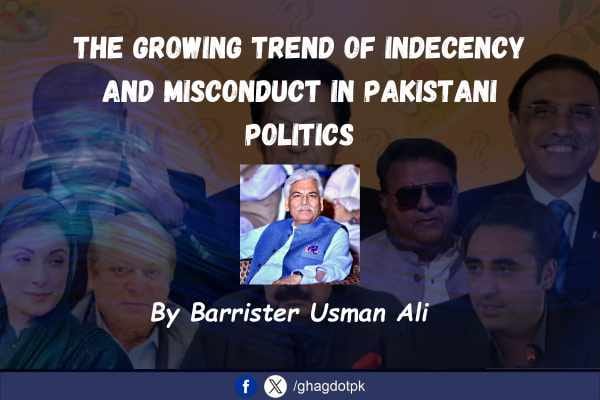By Barrister Usman Ali, Ph.D.
In Pakistani politics, disagreements have always existed, but their nature and intensity have evolved. In the past, differences among political parties were largely limited to ideologies and policies, and these disagreements were generally expressed in a somewhat civilized manner. Although political figures and activists occasionally used harsh language in speeches, these differences rarely escalated into personal enmities or retaliatory politics. Even during times of heightened tensions, apologies were often extended with open hearts.
The entry of Imran Khan into politics has drastically changed this traditional political landscape. Khan’s approach has gone beyond ideological differences, targeting opponents on a personal level. His politics have encouraged supporters and activists to adopt a confrontational style, where opponents are subjected to verbal abuse and ridicule. A systematic campaign of hostility and slander was launched against those with differing opinions, aimed at silencing or damaging their reputation.
This trend was not confined to ordinary politicians but extended to high-ranking military officials, judges, journalists, and active social media figures who opposed Imran Khan or the narrative of his party, Pakistan Tehreek-e-Insaf (PTI). These individuals faced intense trolling, abusive language, and personal attacks on social media, with no restraint on decorum or decency. A deliberate smear campaign was waged against opponents, involving people of all ages and genders among PTI supporters, reflecting a culture of aggression and intolerance rather than dialogue and patience within the party.
In these circumstances, Pakistan’s political culture has reached a new and troubling turning point, where personal attacks against opponents have become commonplace. This has not only deepened divisions within society but has also harmed political tolerance, dialogue, and democratic values. Under Imran Khan’s leadership, PTI has introduced an aggressive narrative in politics that leaves little room for reasoned discourse and instead emphasizes hostility and humiliation.
Recently, an unfortunate incident took place in London, where Pakistan’s former Chief Justice Qazi Faez Isa was subjected to severe harassment and ridicule. As Justice Isa, accompanied by his wife, exited an event at Middle Temple, PTI activists followed and verbally assaulted him. Viral social media videos show individuals hurling insulting remarks at him.
This incident reflects how political differences have transformed into personal hostility and revenge. Justice Qazi Faez Isa, an esteemed judge and the first Pakistani selected as a bencher at Middle Temple, was harassed in a manner that highlights the growing intolerance and politics of hate within Pakistani society. Imran Khan and PTI supporters frequently target their opponents on a personal level, whether they are politicians, journalists, or respected members of the judiciary.
This type of behavior not only insults individuals or positions but also violates the integrity of the entire judicial system and democratic principles. It demonstrates that the culture of political intolerance and personal attacks, which has intensified following Imran Khan’s departure from power, has now extended beyond Pakistan’s borders, becoming a form of hateful chaos. Such incidents tarnish the country’s image and reflect the decline of collective ethics and decorum in society.
It is the responsibility of everyone who believes in democratic values, ethics, and social decency to strongly condemn and oppose such actions. All aware and serious segments of society should not only discourage such behavior but also speak out against those who promote this type of abusive and hateful conduct. Freedom of opinion is a fundamental democratic right, but it must be expressed within the bounds of civility and respect.
Since these undesirable elements have made this behavior a habit, the government must take strict action against those who exhibit this uncivil behavior toward esteemed individuals within the judiciary and other institutions. To prevent such incidents, the government must ensure the enforcement of the law and bring the responsible parties to justice. The government should also consider appropriate measures to curb hate speech on social media, creating an environment where the dignity of individuals and institutions is protected.
Promoting civility, tolerance, and dialogue in politics and society is essential for nurturing a community founded on mutual respect and positive discourse. The government must go beyond mere public statements and take prompt and decisive action against such incidents. Simply issuing notices or statements is insufficient. Effective legal action and accountability are necessary against those who repeatedly target opponents through harassment, ridicule, and hostility. Restricting individuals engaged in objectionable activities on social media is not a restriction on freedom of expression but rather a means of safeguarding society’s moral values. Freedom of expression has its limits, and anyone crossing those limits is committing a crime for which penalties are established.
The government should also address such incidents on an international level, particularly with the UK government. It should work with British authorities to prosecute those involved in incidents like those in London under British law, ensuring that such troublemakers are brought to justice and that future incidents are prevented.
The Pakistani government should mobilize the embassy in the UK and work with local law enforcement to identify individuals persistently engaging in abusive behavior against PTI’s opponents. Holding these elements accountable under the law is necessary to send a clear message that such incivility and disrespect are unacceptable, regardless of the party or individual involved.
Additionally, the Pakistani government should improve cooperation and diplomatic engagement with the UK to address such issues effectively. Such steps will not only uphold the rule of law but also protect Pakistan’s global image and integrity.






